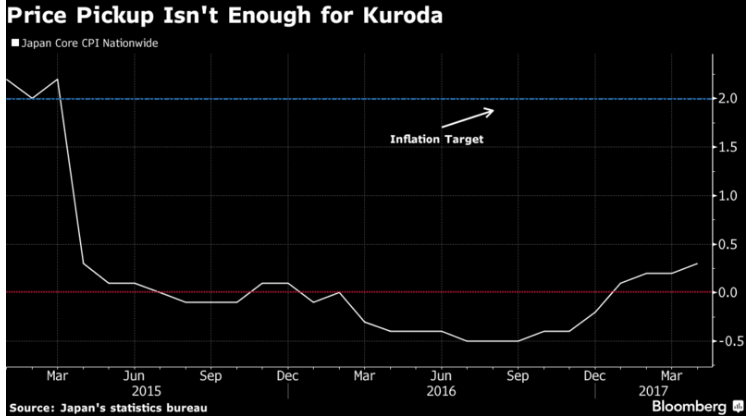In Japan, data from the Internal Affairs Ministry showed on Friday that Japan’s core consumer inflation gauge rose for a fourth month in April, the longest run of gains since mid-2015, but remains far below the central bank's target. Both headline and core CPI inflation for April increased to 0.4 percent y/y and 0.3 percent y/y, respectively, but they remain well below the Bank of Japan’s (BoJ) target of 2.0 percent.
The Bank of Japan's preferred measure of core CPI (excluding fresh foods and energy) and its forecast measure of core CPI (excluding fresh foods) rose 0.1ppt to 0.0 percent Y/Y and 0.3 percent Y/Y respectively. The ‘core’ core rate, the measure consistent with core measures used in the other major economies, was still firmly in negative territory, unchanged on the month at 0.3 percent Y/Y, the lowest rate for almost four years just after the launch of QQE.
"We expect inflation to maintain a gradual upward trend over coming months associated with base effects of energy costs, with core CPI likely to rise close to 1%Y/Y by around September. But given the persistent weakness of underlying inflation, and not least due to the behaviour of wages which will likely serve to both limit cost pressures and restrain demand, we think that inflation will likely struggle to shift significantly higher than that," said Daiwa Capital Markets in a report.
Bank of Japan Governor Haruhiko Kuroda is pinning his hopes on rising energy costs, wage gains and the BOJ’s monetary stimulus program. Since wage growth remains weak, cost pressures are not strong enough to sustain stronger inflation. Former Federal Reserve Chairman Ben Bernanke said in Tokyo this week that the BOJ’s policy options are becoming scarce and more explicit cooperation with the government would be appropriate if inflation remains weak.
"Having committed to expanding the balance sheet until core CPI exceeds the 2% target in a stable manner, the Policy Board’s ultra-accommodative policy stance seems set to remain in place for a long time to come," adds Daiwa Capital Markets.
Meanwhile, Japan’s Nikkei 225 closed 0.64 percent lower on Friday at 19,686.84 points. At 1145 GMT, USD/JPY was trading at 111.00, down 0.74 percent on the day. At the same time, FxWirePro's Hourly Yen Strength Index remained highly bullish at 110 (a reading above +75 indicates a bullish trend, while that below -75 a bearish trend). For more details, visit http://www.fxwirepro.com/currencyindex.



 Gold and Silver Prices Slide as Dollar Strength and Easing Tensions Weigh on Metals
Gold and Silver Prices Slide as Dollar Strength and Easing Tensions Weigh on Metals  Nasdaq Proposes Fast-Track Rule to Accelerate Index Inclusion for Major New Listings
Nasdaq Proposes Fast-Track Rule to Accelerate Index Inclusion for Major New Listings  Fed Governor Lisa Cook Warns Inflation Risks Remain as Rates Stay Steady
Fed Governor Lisa Cook Warns Inflation Risks Remain as Rates Stay Steady  Dollar Near Two-Week High as Stock Rout, AI Concerns and Global Events Drive Market Volatility
Dollar Near Two-Week High as Stock Rout, AI Concerns and Global Events Drive Market Volatility  Singapore Budget 2026 Set for Fiscal Prudence as Growth Remains Resilient
Singapore Budget 2026 Set for Fiscal Prudence as Growth Remains Resilient  RBA Raises Interest Rates by 25 Basis Points as Inflation Pressures Persist
RBA Raises Interest Rates by 25 Basis Points as Inflation Pressures Persist  Japan Economy Poised for Q4 2025 Growth as Investment and Consumption Hold Firm
Japan Economy Poised for Q4 2025 Growth as Investment and Consumption Hold Firm  Trump Lifts 25% Tariff on Indian Goods in Strategic U.S.–India Trade and Energy Deal
Trump Lifts 25% Tariff on Indian Goods in Strategic U.S.–India Trade and Energy Deal  MAS Holds Monetary Policy Steady as Strong Growth Raises Inflation Risks
MAS Holds Monetary Policy Steady as Strong Growth Raises Inflation Risks  Silver Prices Plunge in Asian Trade as Dollar Strength Triggers Fresh Precious Metals Sell-Off
Silver Prices Plunge in Asian Trade as Dollar Strength Triggers Fresh Precious Metals Sell-Off  ECB’s Cipollone Backs Digital Euro as Europe Pushes for Payment System Independence
ECB’s Cipollone Backs Digital Euro as Europe Pushes for Payment System Independence  FxWirePro- Major Crypto levels and bias summary
FxWirePro- Major Crypto levels and bias summary  Gold Prices Slide Below $5,000 as Strong Dollar and Central Bank Outlook Weigh on Metals
Gold Prices Slide Below $5,000 as Strong Dollar and Central Bank Outlook Weigh on Metals 































